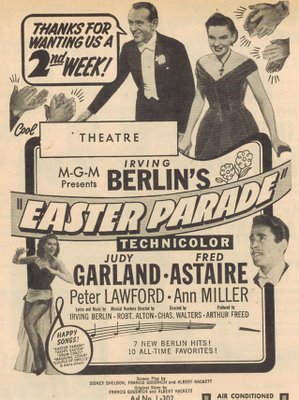
Ann and I sat down and looked at this DVD recently. To my not so great surprise, she had some reservations about it. So what is it with these musicals? I know there are a lot of people who are nuts about ‘em, but for a lot of others, they’re strictly poison ivy. Ann said she couldn’t accept the idea of Judy and Fred ending up together at the end. Was Fred too old? No, she said, the problem was largely Judy. That again? Now, having been down this road before, I won’t belabor the Judy question, except to note that where this actress is concerned, opinions are most assuredly divided. Still, she was the colossus that bestrode Metro's musicals unit --- the only female singing lead they could absolutely depend on to deliver an audience. Based on what I’ve read, it would seem that every conceivable effort was made to save her career in the wake of on-set breakdowns, public tantrums, and suicide attempts. When the talent was switched on and channeled properly, there was no one who could approach Judy, but after numerous commitments and rehabs, the bad outweighed the good to a point where reason dictated her dismissal. In short, MGM did the only thing they could do under dire circumstances. It must have torn those executives up to watch so much talent and money walking out the door. The only financial bust she’d had was The Pirate, and that was more Minnelli’s fault (although surprisingly, the one released after she’d gone, Summer Stock, lost money as well). With Judy out, Metro had to make do with the junior varsity, and that meant, among other things, the continuation of a starring series with Jane Powell, whose shows were modest earners beside the Garland grosses. The second team looked all the more vapid on those occasions when one of them was teamed with Astaire --- Powell in Royal Wedding (scheduled for Judy), Vera-Ellen in The Belle Of New York, and so on. Judy may have seemed age-inappropriate for Fred (by now, who wasn’t?), but talent-wise, no one could have accused him of slumming.
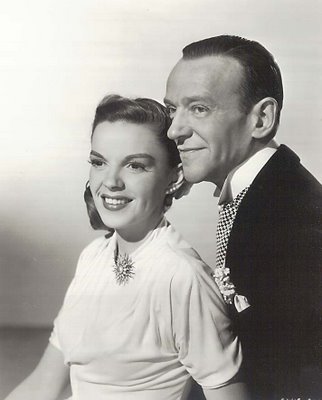
The Easter Parade DVD has one of those "making of" documentaries that are fun enough to watch if you’ve got oodles of time on your hands, which brings up the essential question for all disc collectors. How are we supposed to watch all these extras and listen to all these commentaries? When is there time left to feed the dog, buy groceries, spend time with significant others? There’s at least eight hours of entertainment content on the Easter Parade double-disc (I’m sitting here looking at the box right now), and there’s no way I’ll live long enough to get through all that, let alone the hundreds of other DVD's littering the shelves, nor the hundreds, if not thousands more, to come. Of course, had I not watched this particular behind-the-scenes extra, I might never have known that Ann Miller did all her strenuous Easter Parade dances after a drunken lout of a husband threw her down a flight of stairs when she was nearly nine-months pregnant. Now that was a cold splash of water in an otherwise frothy little piece --- and what about that story on how Gene Kelly was knocked out of the picture after breaking his ankle? I’ve heard at least three different versions of that accident. He was rehearsing, he was playing football --- no, volleyball --- or maybe he was rescuing children from a burning orphanage like Mr. Joseph Young of Africa. Who knows where the truth lies anymore in these oft-told tales?
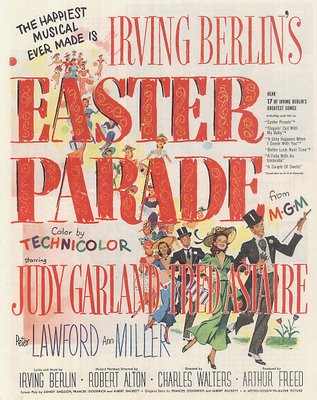
Do these musicals actually play better as excerpts? You’ve got to wonder when you compare the best of Easter Parade as seen in That’s Entertainment 1,2,3…infinity with Easter Parade the stand-alone feature. The songs are still there, but so are the contrivances, the misunderstandings (and always over things that could be cleared up with a single line of dialogue if only someone would speak up!), and the tedium of musical comedy convention. Were the outcomes such a foregone conclusion when these pictures were new? I’m sure they were, but the folks undoubtedly had a little more patience then, though that’s hardly an adequate excuse for your own guests twitching in their seats as they watch this movie. Judging by the sockeroo business it did, Easter Parade pleased all generations of moviegoers, with youngsters buying tickets alongside their grandparents who remembered the Irving Berlin standards revived for this occasion. When would any movie re-unite such a disparate audience under one umbrella again? Within less than a decade, rock n’ roll would splinter us into warring niche groups, and barring one or two exceptions (The Sound Of Music being the most notable), that’s the way it would stay.
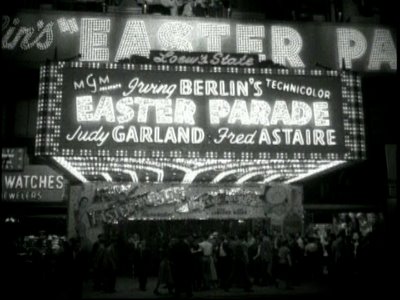
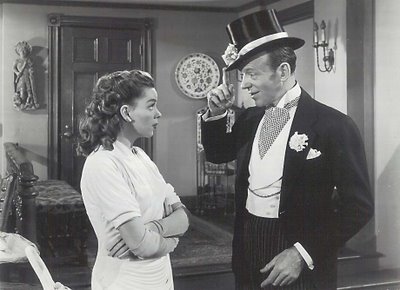
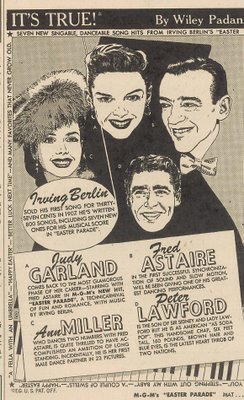
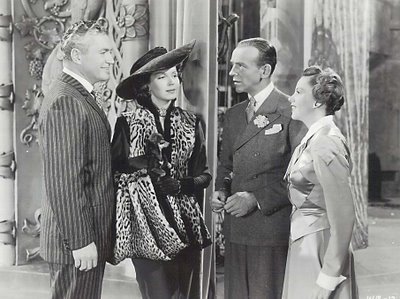
This splashy color magazine ad was part of Metro’s assurance to exhibitors of a hefty gross for Easter Parade. Nobody went hungry with this one in the house. Against a negative cost of $2.6 million (A figure actually surpassed that year by Julia Misbehaves, Cass Timberlane, and Green Dolphin Street), Easter Parade brought back $4.1 in domestic rentals and $1.7 foreign for a worldwide total of $5.9. Profits amounted to $950,000. The only 1948 release to surpass it in black ink was Homecoming. Loews State looks like the place to be in this glimpse of premiere night in NYC. Boy, what a thrill that must have been. I never heard of Wiley Paden before, but his "It’s True!" newspaper feature was fairly typical of publicity plants made more palatable for readers by the use of attractive art and design. Hard to believe Judy was only in her mid-twenties when she did this portrait sitting with Fred. She seems older. What a price this woman paid for stardom, and you get the impression she never even wanted it that much. Notice how Ann Miller regards Judy in this next one --- Yeah, sweetie, I can dance rings around you and sing besides. I know Ann’s in character for the still, but she had to resent all that fuss and bother that swirled around pampered Judy, while troupers like her bled in their tap shoes. With Judy’s expulsion from the lot less than two years later, a lot of them would have a grab at that top rung, their patience only fitfully rewarded, as Metro and its musicals would themselves be headed for commercial, if not artistic, collapse.
